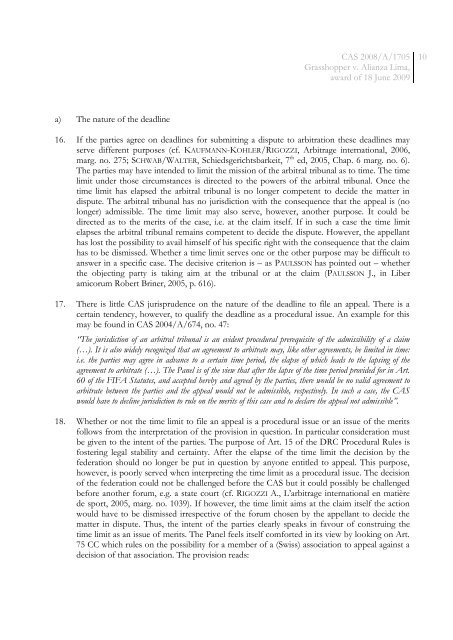TAS xxx
TAS xxx
TAS xxx
You also want an ePaper? Increase the reach of your titles
YUMPU automatically turns print PDFs into web optimized ePapers that Google loves.
CAS 2008/A/1705<br />
Grasshopper v. Alianza Lima,<br />
award of 18 June 2009<br />
10<br />
a) The nature of the deadline<br />
16. If the parties agree on deadlines for submitting a dispute to arbitration these deadlines may<br />
serve different purposes (cf. KAUFMANN-KOHLER/RIGOZZI, Arbitrage international, 2006,<br />
marg. no. 275; SCHWAB/WALTER, Schiedsgerichtsbarkeit, 7 th ed, 2005, Chap. 6 marg. no. 6).<br />
The parties may have intended to limit the mission of the arbitral tribunal as to time. The time<br />
limit under those circumstances is directed to the powers of the arbitral tribunal. Once the<br />
time limit has elapsed the arbitral tribunal is no longer competent to decide the matter in<br />
dispute. The arbitral tribunal has no jurisdiction with the consequence that the appeal is (no<br />
longer) admissible. The time limit may also serve, however, another purpose. It could be<br />
directed as to the merits of the case, i.e. at the claim itself. If in such a case the time limit<br />
elapses the arbitral tribunal remains competent to decide the dispute. However, the appellant<br />
has lost the possibility to avail himself of his specific right with the consequence that the claim<br />
has to be dismissed. Whether a time limit serves one or the other purpose may be difficult to<br />
answer in a specific case. The decisive criterion is – as PAULSSON has pointed out – whether<br />
the objecting party is taking aim at the tribunal or at the claim (PAULSSON J., in Liber<br />
amicorum Robert Briner, 2005, p. 616).<br />
17. There is little CAS jurisprudence on the nature of the deadline to file an appeal. There is a<br />
certain tendency, however, to qualify the deadline as a procedural issue. An example for this<br />
may be found in CAS 2004/A/674, no. 47:<br />
“The jurisdiction of an arbitral tribunal is an evident procedural prerequisite of the admissibility of a claim<br />
(…). It is also widely recognized that an agreement to arbitrate may, like other agreements, be limited in time:<br />
i.e. the parties may agree in advance to a certain time period, the elapse of which leads to the lapsing of the<br />
agreement to arbitrate (…). The Panel is of the view that after the lapse of the time period provided for in Art.<br />
60 of the FIFA Statutes, and accepted hereby and agreed by the parties, there would be no valid agreement to<br />
arbitrate between the parties and the appeal would not be admissible, respectively. In such a case, the CAS<br />
would have to decline jurisdiction to rule on the merits of this case and to declare the appeal not admissible”.<br />
18. Whether or not the time limit to file an appeal is a procedural issue or an issue of the merits<br />
follows from the interpretation of the provision in question. In particular consideration must<br />
be given to the intent of the parties. The purpose of Art. 15 of the DRC Procedural Rules is<br />
fostering legal stability and certainty. After the elapse of the time limit the decision by the<br />
federation should no longer be put in question by anyone entitled to appeal. This purpose,<br />
however, is poorly served when interpreting the time limit as a procedural issue. The decision<br />
of the federation could not be challenged before the CAS but it could possibly be challenged<br />
before another forum, e.g. a state court (cf. RIGOZZI A., L‟arbitrage international en matière<br />
de sport, 2005, marg. no. 1039). If however, the time limit aims at the claim itself the action<br />
would have to be dismissed irrespective of the forum chosen by the appellant to decide the<br />
matter in dispute. Thus, the intent of the parties clearly speaks in favour of construing the<br />
time limit as an issue of merits. The Panel feels itself comforted in its view by looking on Art.<br />
75 CC which rules on the possibility for a member of a (Swiss) association to appeal against a<br />
decision of that association. The provision reads:

















